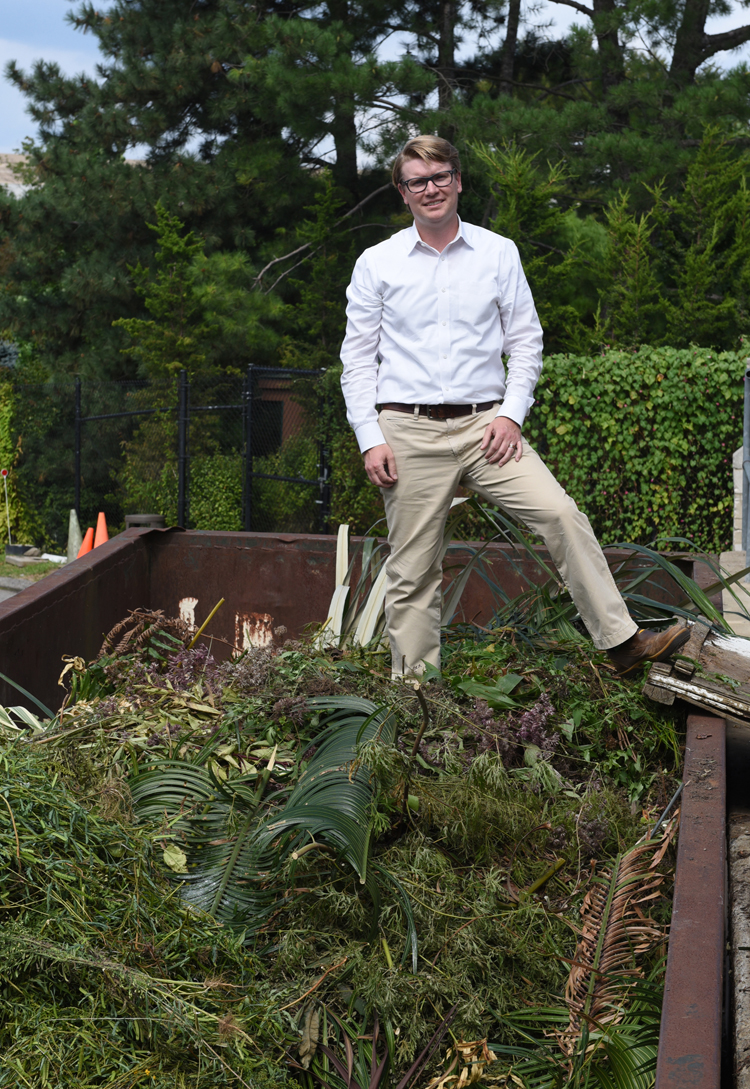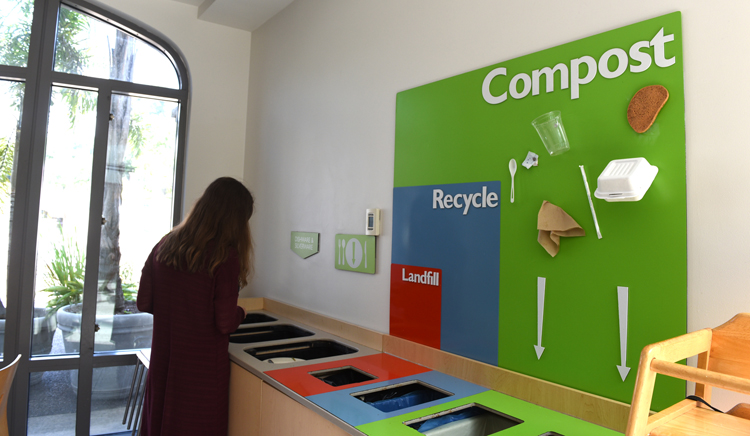How to compost with the help of Phipps
Posted on: September 14, 2017 | Written By: Doug Oster |
A thick layer of plants that fills a dumpster behind Phipps Conservatory and Botanical Gardens is being sent away to be transformed into compost.
“Roughly 80 percent of all of our waste we have on campus is compostable,” says Jason Wirick, director of facilities and sustainability at Phipps.

Jason Wirick is the director of facilities and sustainability at Phipps Conservatory and Botanical Gardens. This entire dumpster of plants will eventually become compost. “Roughly 80 percent of all of our waste we have on campus is compostable, he says. Photos by Doug Oster
That includes food from the cafe and catering events, which accounts for 60 percent, and plant material like what’s in the dumpster, which is 20 percent. Combine that with traditional recycling and an astonishing 94 percent of the waste leaving Phipps is not ending up in a landfill. At this point there’s no composting operation on site, but that’s coming soon. Agri-Cycle is a local company that collects their food scraps and turns it into compost and another operation deals with the plants.
The same techniques used at Phipps can easily be done at home too. The step is called splitting the waste stream. Things that once were thrown in the trash are now put somewhere else and then taken to the compost pile. At Cafe Phipps, they have spent the last eight years refining a bussing station that shows visitors where cups, plates, food and other things are to be sorted after finishing a meal.

This area at Cafe Phipps at Phipps Conservatory and Botanical Gardens explains where waste goes so that it’s either recycled, composted or sent to a landfill.
For any good compost, you need browns and greens, Wirick says. Browns are carbon-rich materials like leaves, newspaper, wood chips and dried grasses. Greens are grass clippings and the items saved from the kitchen and garden. To make the best home compost as fast as possible, combine three parts brown ingredients with one part green.
“It’s really keeping it simple,” he says. “Keep an eye on it, move it around, you’re getting air into it and it needs moisture.”
But you don’t want to put in meat, bones, salad oils, fatty stuff, plants that could carry diseases and pet waste, Wirick warns.
The compost that’s returned to Phipps is used in almost every part of raising plants, because it’s the building block for good growing.
“It’s adding more life into the soil, which helps provide nutrients for the plants,” Wirick says.
Besides making something that gives plants everything they need, composting helps the planet too.
“It’s critically important,” he says. “Thirty percent of the waste that comes out of the house could go back in the ground or become fertilizer for your garden.”
Doug Oster is editor of Everybody Gardens, a website operated by 535Media, LLC. Reach him at 412-965-3278 or doster@535mediallc.com. See other stories, videos, blogs, tips and more at everybodygardens.com.
Doug’s composting tips-
Sorting: I use a three bin system made out of shipping pallets. It takes about a year to fill the first with things out of the kitchen and garden. Once it’s filled, we begin filling the second and so on. At some point the first bin is ready. When it’s sweet smelling, dark with a fine texture, it’s ready for the garden.
The family might be resistant to learn how to split the waste stream, but once a plan is under way, everyone will get on board. Have an container for things to be composted and for others to be thrown away. Teach everyone what goes where and explain the many benefits of composting.
There are closed systems available too, including rotating bins that can make compost quickly.
Greens and browns: I should pay attention to the ratio of greens and browns added to the pile for optimal compost, but don’t. I add some shredded leaves every time I dump the bucket coming out of the kitchen. Remember that everything that once was living can become compost. It might take longer this way and might not be as nutrient rich, but my plants love it anyway. Don’t let the fact that you might not have enough browns stop you from composting.
Benefits: Compost will give plants everything they need. When they have everything they need, they will fight off diseases and pests. Add it to planting holes, use as mulch and improve beds with compost.
One of the biggest surprises new composters discover is the amount of material that no longer goes out to the curb. It’s a good feeling that it stays on site and might be the best way to recycle as gardeners get the direct benefit of the results in the form of compost.
Learn to compost through Pennsylvania Resources Council, who hold classes all over the area. Details: 412-488-7490 or prc.org